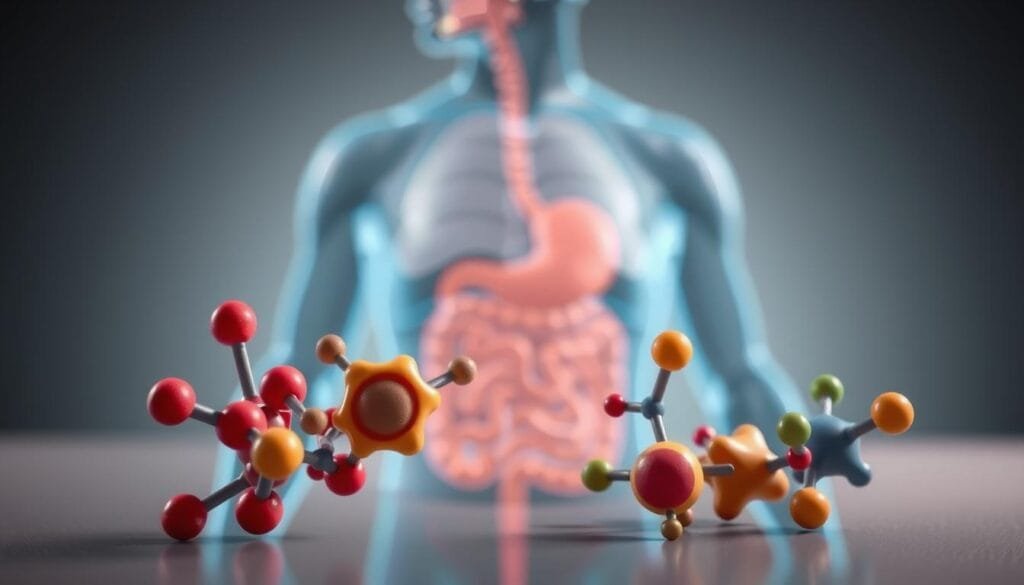Currently Empty: RM0.00
Ever wondered why some people digest food effortlessly while others struggle with bloating and discomfort? The answer often lies in digestive enzymes. These tiny helpers break down proteins, fats, and carbs, ensuring nutrients get absorbed properly.
Many face digestive issues like gas or intolerance without realizing plant-based enzymes—such as those from fungal sources—work better than animal-derived ones. Selecting the best option depends on individual needs, diet, and health goals.
Wellness Concept specializes in tailored solutions. For expert advice, contact them at +60123822655. Keep reading to explore enzyme types, benefits, and smart selection strategies.
Key Takeaways
- Digestive enzymes improve nutrient absorption and gut health.
- Plant-based enzymes often outperform animal-derived versions.
- Common issues like bloating may signal enzyme deficiencies.
- Personalized selection maximizes health benefits.
- Wellness Concept offers expert guidance for enzyme fiber needs.
Understanding Digestive Enzymes and Their Role
Without enzymes, even the healthiest meals could leave you feeling sluggish and bloated. These tiny proteins, produced in the mouth, stomach, and pancreas, act as catalysts to break down food into absorbable nutrients.
What Are Digestive Enzymes?
Digestive enzymes are specialized proteins. They target specific macronutrients—carbs, fats, and proteins—splitting them into smaller molecules. For example, lactase helps dairy-sensitive individuals digest milk sugar.
Natural enzyme production slows with age or chronic stress. This decline often leads to undigested food fermenting in the gut, causing gas and discomfort.
“Enzyme deficiencies don’t just cause bloating; they starve the body of essential vitamins and minerals.”
Why Are They Important for Digestion?
Proper digestion relies on enzymes to unlock nutrients. Without them, food passes through the system mostly unused, leading to deficiencies.
| Enzyme Type | Target Nutrient | Function |
|---|---|---|
| Amylase | Carbohydrates | Breaks starches into sugars |
| Protease | Proteins | Divides proteins into amino acids |
| Lipase | Fats | Converts fats into fatty acids |
Conditions like lactose intolerance highlight enzyme importance. Supplementing with the right enzymes can restore digestive balance and boost overall health.
Common Types of Digestive Enzymes
Not all enzymes work the same—some focus on carbs, others on proteins or fats. Understanding these differences helps tailor supplementation for better digestion, especially in Malaysia’s diverse food culture.

Amylase: For Carbohydrate Breakdown
Amylase targets starches in foods like rice, noodles, and bread. It converts them into simple sugars for energy. Without enough amylase, heavy carb meals can cause bloating.
Plant-based amylase, often from fungi, works efficiently across pH levels. This makes it ideal for Malaysia’s carb-rich dishes, from nasi lemak to roti canai.
Protease: For Protein Digestion
Protease breaks down proteins in meats, legumes, and tofu. A deficiency may lead to post-meal fatigue or indigestion.
“Protease supplements can ease digestion of satay or rendang, reducing gut strain.”
Fungal protease outperforms animal-derived versions by working in both stomach and intestinal environments.
Lipase: For Fat Absorption
Rich dishes like curry laksa rely on lipase to process coconut milk and oils. This enzyme turns fats into absorbable fatty acids.
Those with gallbladder issues often benefit from lipase supplements. Plant-based lipase also supports healthier cholesterol levels.
Lactase: For Dairy Intolerance
Malaysia’s love for teh tarik and cheese-filled snacks makes lactase essential. It breaks down lactose, preventing cramps and bloating.
Nearly 70% of Malaysians experience lactose intolerance. Lactase supplements allow enjoyment of dairy without discomfort.
| Enzyme | Best For | Malaysian Food Examples |
|---|---|---|
| Amylase | Carbs | Rice, noodles, kuih |
| Protease | Proteins | Satay, tempeh, fish |
| Lipase | Fats | Curry, fried dishes |
| Lactase | Dairy | Teh tarik, cheese roti |
Plant-based enzymes often digest foods more thoroughly than animal-derived options. They adapt to Malaysia’s varied meals, from spicy to sweet.
Key Benefits of Enzyme Fiber Supplements
Digestive discomfort doesn’t have to be a daily struggle—enzyme supplements can make a difference. These powerful aids tackle undigested food, transforming meals into fuel rather than frustration.
Reducing Bloating and Gas
Fermentation of undigested food in the gut often leads to bloating. Enzyme supplements like Enzymedica’s Thera-blend™ break down carbs, fats, and proteins efficiently, reducing gas and discomfort.
Studies show plant-based enzymes work across pH ranges, making them ideal for diverse diets. Fewer digestive issues mean more energy post-meals.
Enhancing Nutrient Absorption
Without proper breakdown, vitamins and minerals pass through unused. Protease, amylase, and lipase ensure nutrients like iron and B12 get absorbed.
“Better nutrient uptake supports immunity and overall vitality.”
Supporting Gut Health
Long-term enzyme use promotes a balanced microbiome. NSF-certified blends ensure safety, avoiding fillers that irritate sensitive guts.
| Benefit | Key Enzyme | Outcome |
|---|---|---|
| Less bloating | Amylase, Lipase | Reduced gas |
| Better nutrition | Protease | Improved energy |
| Gut balance | Broad-spectrum blends | Healthier microbiome |
For those in Malaysia, enzyme supplements adapt to local cuisine—spicy, fried, or dairy-heavy. The right blend turns meals into nourishment, not discomfort.
How to Choose the Right Enzyme Fiber
Digestive wellness hinges on selecting enzyme blends tailored to individual needs. Symptoms like bloating or fatigue often reveal which proteins, carbs, or fats aren’t breaking down properly. Tracking reactions to meals simplifies the process.
Pinpointing Digestive Needs
Gas after carb-heavy meals? Amylase might be lacking. Heavy meats causing discomfort? Protease could help. A food diary clarifies patterns, guiding personalized choices.
Opting for Broad-Spectrum Blends
For general use, formulas with multiple enzymes—like amylase, protease, and lipase—cover diverse meals. Plant-based versions adapt to Malaysia’s spicy, fried, and dairy-rich dishes without losing potency.
“Activation units (HUT, DU) determine efficacy—not just milligram weights.”
Avoiding Allergens and Fillers
Low-quality products often contain gluten, soy, or artificial additives. NSF-certified options, like Wellness Concept’s allergen-free line, ensure purity and safety.
| Enzyme | Activation Unit | Target Nutrient |
|---|---|---|
| Protease | HUT (Hemoglobin Units) | Proteins |
| Amylase | DU (Dextrinizing Units) | Carbohydrates |
| Lipase | FIP (Federation Internationale Pharmaceutique) | Fats |
Prioritizing high-activation blends maximizes nutrient absorption. For tailored advice, consult experts familiar with Malaysia’s dietary landscape.
Matching Enzyme Supplements to Your Diet
Different diets demand specific enzymes for optimal digestion and nutrient absorption. Malaysian favorites like satay or nasi lemak each require unique support. Pairing the right enzymes with meals prevents discomfort and boosts energy.
High-Protein Diets
Grilled meats, tofu, and legumes pack proteins that need protease. Without it, heavy meals cause fatigue. Plant-based protease works faster than animal-derived versions, easing digestion of rendang or ayam percik.
High-Carb or High-Fiber Diets
Rice, noodles, and veggies rely on amylase and cellulase. These enzymes break carbohydrates into sugars for energy. A blend of both handles Malaysia’s carb-heavy staples—from char kway teow to rojak.
“Keto enthusiasts benefit from extra lipase to process coconut milk and fried foods.”
Dairy-Heavy Diets
With 70% of Malaysians lactose intolerant, lactase is essential. It turns milk sugar into digestible forms, making teh tarik and cheese roti enjoyable again.
| Diet Type | Key Enzyme | Local Food Examples |
|---|---|---|
| High-protein | Protease | Satay, tempeh, ikan bakar |
| High-carb/fiber | Amylase + Cellulase | Nasi lemak, kuih, ulam |
| Dairy-heavy | Lactase | Teh tarik, butter naan |
Tailoring enzymes to dietary habits ensures meals fuel the body, not frustration. For personalized advice, consult experts familiar with Malaysia’s diverse cuisine.
Tips for Taking Enzyme Supplements Effectively
Proper timing and dosage make enzyme supplements far more effective. Whether tackling bloating or boosting nutrient absorption, small tweaks in routine can enhance results. Here’s how to optimize intake for Malaysia’s diverse cuisine.

Timing Your Dosage
Take enzymes 15 minutes before meals. This allows activation as food enters the stomach. For heavy dishes like nasi lemak or laksa, pre-meal dosing ensures full breakdown.
Avoid consuming supplements on an empty stomach. Without food, enzymes may irritate the gut lining instead of aiding digestion.
Starting with a Low Dose
Begin with one capsule per meal. Gradually increase if symptoms persist. Overloading can cause cramps, especially with high-potency blends.
“Adjust doses for large meals—extra capsules help process festive spreads like Raya feasts.” —Wellness Concept
Avoiding Common Mistakes
Don’t use enzymes as a cure-all for chronic issues like GERD. They aid digestion but don’t replace medical treatment.
For persistent discomfort, consult experts via WhatsApp. Wellness Concept tailers advice to Malaysia’s spicy, fried, and dairy-rich diets.
- Pre-meal timing boosts effectiveness.
- Low initial doses prevent side effects.
- Quality matters—avoid fillers in cheap supplements.
Conclusion
Optimal digestion starts with the right digestive enzymes. Personalized blends address unique needs, from bloating relief to better nutrient absorption. The long-term health benefits—improved energy, gut balance, and immunity—make enzyme supplementation worthwhile.
For tailored advice, consult Wellness Concept’s experts. They analyze dietary habits and recommend effective solutions for Malaysia’s diverse cuisine. Reach them via WhatsApp at +60123822655 (Mon-Fri 9:30am-6:30pm, Sat-Sun 10am-5pm).
Discover more about gut wellness in this guide to fiber benefits. Take action today—your digestive system will thank you.
FAQ
What are digestive enzymes?
Digestive enzymes are proteins that help break down food into smaller, absorbable nutrients. They support digestion by targeting carbs, fats, and proteins.
Why are enzymes important for digestion?
Without proper enzyme activity, the body struggles to process food efficiently. This can lead to bloating, gas, and poor nutrient absorption.
Which enzymes help with lactose intolerance?
Lactase is the key enzyme that breaks lactose into simpler sugars. Supplements like Lactaid contain lactase to ease dairy digestion.
How do enzyme supplements reduce bloating?
They enhance food breakdown, preventing undigested particles from fermenting in the gut. This minimizes gas and discomfort after meals.
Should I take a single enzyme or a blend?
Broad-spectrum blends (like NOW Super Enzymes) often work best, as they address multiple food types—carbs, fats, and proteins—simultaneously.
When’s the best time to take enzyme supplements?
Ideally right before or with meals. This ensures enzymes mix with food for optimal breakdown in the stomach and small intestine.
Can enzyme supplements help with high-protein diets?
Yes! Protease-heavy formulas (such as Pure Encapsulations Digestive Enzymes) aid protein digestion, reducing heaviness after meat-heavy meals.
Are there side effects to enzyme supplements?
Most people tolerate them well, but high doses may cause mild nausea. Starting with a low dose helps the body adjust.



